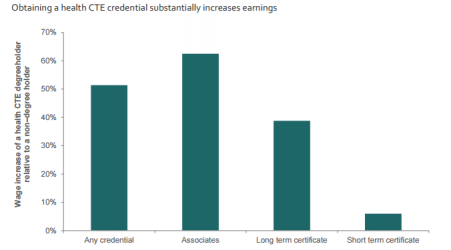 Contributing to a growing body of research on the economic benefit of industry credentials, the Public Policy Institute of California last month released a study of employment outcomes for students in health Career Technical Education (CTE) programs in the California Community College system. In California, 18 of the top 25 wage-enhancing degrees are in health. As such, helping students obtain a health-related credential could be one strategy for closing achievement gaps and providing underserved students an on-ramp into the industry.
Contributing to a growing body of research on the economic benefit of industry credentials, the Public Policy Institute of California last month released a study of employment outcomes for students in health Career Technical Education (CTE) programs in the California Community College system. In California, 18 of the top 25 wage-enhancing degrees are in health. As such, helping students obtain a health-related credential could be one strategy for closing achievement gaps and providing underserved students an on-ramp into the industry.
The authors of the study examined data for a total of 120,000 students enrolled in health CTE programs in California community colleges over the past ten years. Their research found that, despite variations in completion and persistence across different programs, students who obtained credentials increased their earnings by 51 percent compared to non-degree holders.
Earning a credential translates to real changes in earning opportunity. According to the study, students who were not previously employed in the health industry saw a median increase of $8,661 in quarterly earnings after completing a degree or credential.
While a health-related credential may create economic opportunity for underserved students, completion gaps between subpopulations persist. According to the study, there is a six point gap in completion rates for Latino students compared to white students, and a 12 point gap for African American students. However, the researchers also found that providing career guidance and support services could help close the completion gap by helping underserved students identify and complete pathways in high-demand career fields.
A Holiday Surprise from the National Skills Coalition: 50-State Skills Equity Policy Scans
Meanwhile, the National Skills Coalition released an early Christmas gift in the form of four 50-state policy scans. The scans are part of the organization’s Skills Equity series, which includes toolkits to help policymakers identify effective strategies for expanding access to middle-skills training.
One of the reports dives into an increasingly popular method of addressing basic skills gaps, known as Integrated Education and Training, or IET. Now a required activity under the Workforce Innovation and Opportunity Act (WIOA), IET integrates basic academic education with workforce training in order to prepare adults with basic skills for the workforce. While these adults, who are often inhibited by limited English proficiency or mathematical skills, generally struggle to find job opportunities, research shows that IET programs can increase earning potential for students who take at least two credits and earn a credential.
Other scans in the series include state policies on Stackable Credentials, Alignment and Job-Driven Financial Aid.
Odds and Ends
A new report from the Center for Public Education provides a summary overview of CTE, including data and key questions to help policymakers make the case for expanding CTE offerings. While introductory, the report is essential reading for anyone new to CTE.
The National Opportunity Index – which examines education, crime rates, job availability and other indicators to determine a snapshot of economic opportunity by county and state – is out with new data for 2016. While overall opportunity has remained stagnant over the past year, the index demonstrates an increase of 8.9 percent since 2011.
In a series of policy papers released last month, the Education Commission of the States explores strategies for state and federal policymakers to form partnerships to support postsecondary education. One paper highlights opportunities to leverage the Workforce Innovation and Opportunity Act of 2014 (WIOA) to support community colleges, such as by using sector partnerships to create career pathways or offering programs that qualify for WIOA support.
Austin Estes, Policy Associate
Tags: Center for Public Education, Education Commission of the States, Health Science, industry credentials, National Opportunity Index, National Skills Coalition, Postsecondary Education, WIOA

